Scholarly Articles
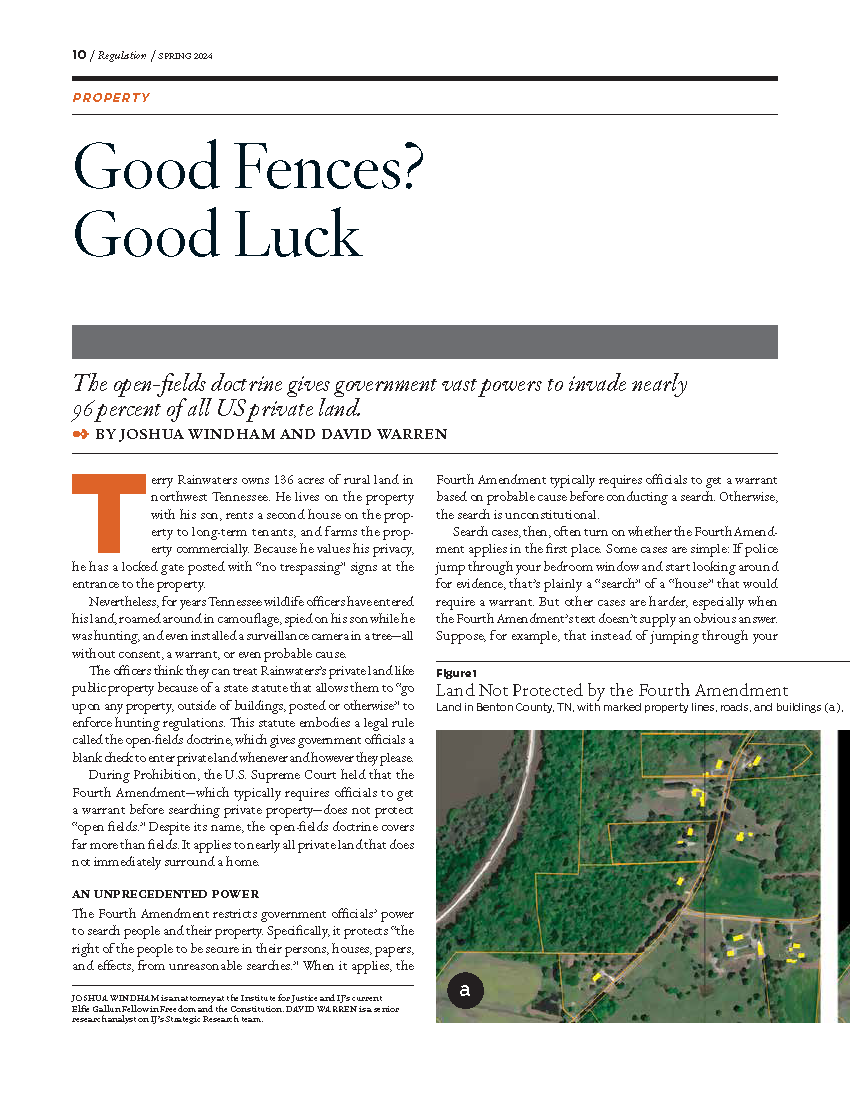
4th Amendment Project | Open Fields Doctrine
Good Fences? Good Luck
Released in the Cato Institute’s Regulation magazine, IJ’s study “Good Fences? Good Luck” is the first study to put a number on the amount of private property vulnerable to warrantless searches by federal agents thanks to a…
Immunity and Accountability
Unqualified Immunity and the Betrayal of Butz v. Economou: How the Supreme Court Quietly Granted Federal Officials Absolute Immunity for Constitutional Violations
Betraying the long history of federal accountability in the United States, the modern Supreme Court has ushered in an era of increasingly absolute and unqualified immunity for federal officials.
Immunity and Accountability
Recalibrating Qualified Immunity: How Tanzin v. Tanvir, Taylor v. Riojas, and McCoy v. Alamu Signal the Supreme Court’s Discomfort with the Doctrine of Qualified Immunity
Recent decisions by the Supreme Court offer the strongest signal in decades that the Court is ready to recalibrate its qualified immunity jurisprudence.
Other Property Rights Abuses | Private Property
A Case Study of Municipal Taxation by Citation
This study examines taxation by citation—local governments using code enforcement and the justice system to raise revenue rather than solely to advance public health and safety. It does so through a detailed case study of…
Educational Choice
The Status of Use-Based Exclusions & Educational Choice After Espinoza
In this article, Michael Bindas discusses the U.S. Supreme Court’s decision in Espinoza v. Montana Department for Revenue, in which the Court held that states cannot bar families participating in educational choice programs from choosing…
Civil Forfeiture | Private Property
A New Panel Dataset for Studies Using Substate Units of Analysis and Indicators of Drug Activity
This research note reports on the creation of a new panel dataset using multiple waves of substate estimates from the National Survey on Drug Use and Health. It also provides identifying information that contains state,…
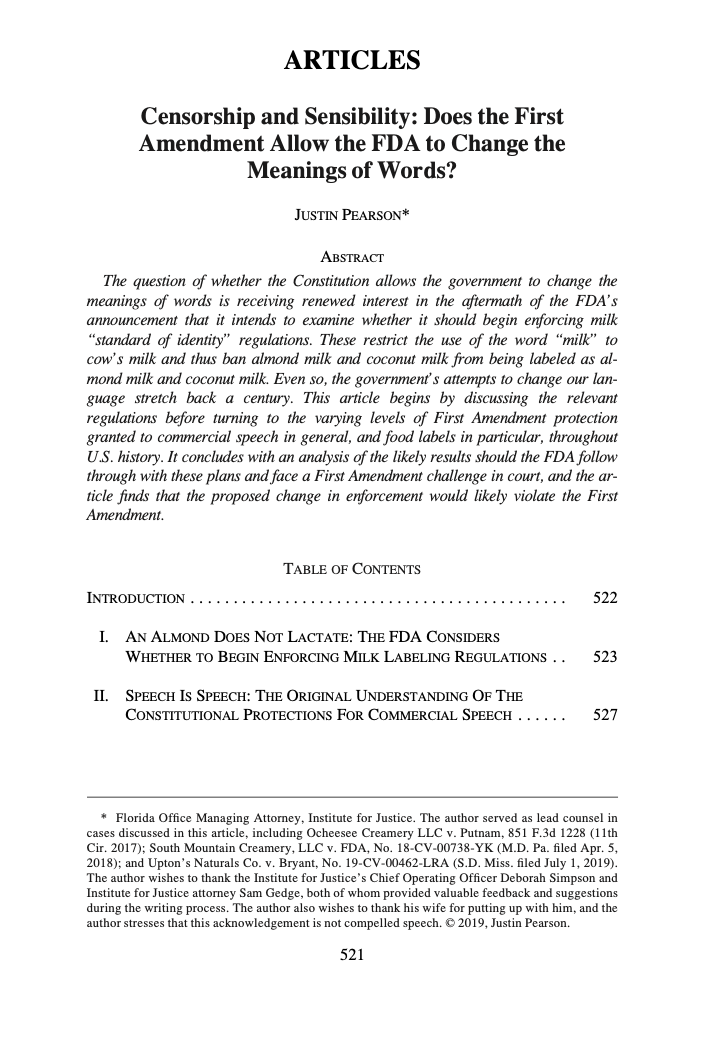
Commercial Speech | Economic Liberty | First Amendment | Food Freedom | Food Freedom
Censorship and Sensibility: Does the First Amendment Allow the FDA to Change the Meanings of Words?
The question of whether the Constitution allows the government to change the meanings of words is receiving renewed interest in the aftermath of the FDA’s announcement that it intends to examine whether it should begin…
Economic Liberty | Food Freedom
The relationship between cottage food laws and business outcomes
The increasing popularity of cottage foods in the United States requires that state laws regulating the industry be given careful consideration. However, little is known about cottage food producers or their businesses. This article discusses…
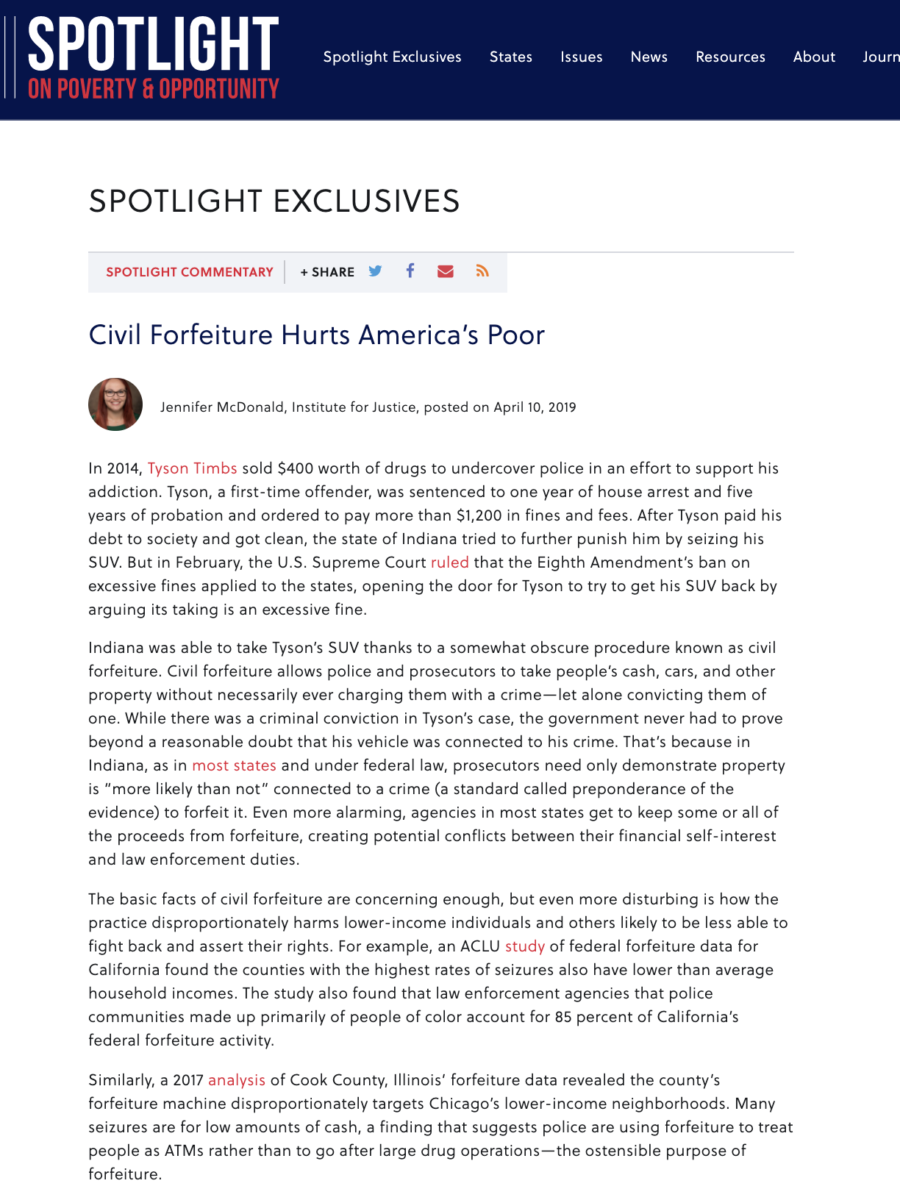
Civil Forfeiture | Private Property
Civil Forfeiture Hurts America’s Poor
In 2014, Tyson Timbs sold $400 worth of drugs to undercover police in an effort to support his addiction. Tyson, a first-time offender, was sentenced to one year of house arrest and five years of…
Economic Liberty | Occupational Licensing
The Continuing Burden of Occupational Licensing in the United States
This study follows up an earlier study in which we examined the scope and burden of 102 occupational licensing laws in the United States for low‐ and moderate‐income occupations. Using data collected in 2017, findings…
Economic Liberty | Occupational Licensing
You’ll Need a License for That Job
In 2013, Heather Kokesch Del Castillo found herself in an unfulfilling career and began to question whether she was following her true passion. At the same time, she was growing increasingly dissatisfied with her physical…
Economic Liberty | Vending
Street Vending in the United States: A Unique Dataset from a Survey of Street Vendors in America’s Largest Cities
The data described in this article come from an original survey of street vendors in the 50 largest cities in the United States. One of the most persistent, although little understood, features of the urban…
Civil Forfeiture | Private Property
The Questionable Ethics of Civil Forfeiture
On a cool, sunny November day, Mark Brewer – a disabled decorated U.S. Air Force veteran – was driving through the state of Nebraska on his way to Los Angles to visit his uncle. While…
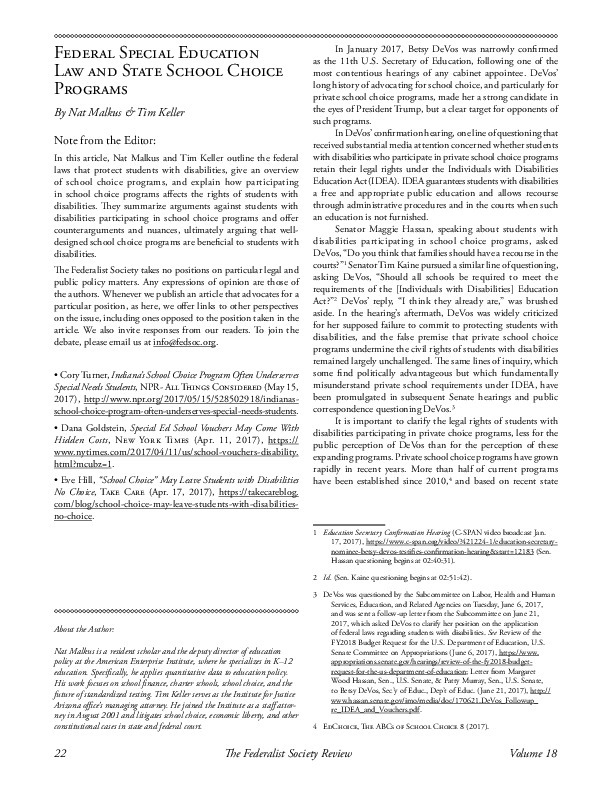
Educational Choice
Federal Special Education Law and State School Choice Programs
In this article, Nat Malkus and Tim Keller outline the federal laws that protect students with disabilities, give an overview of school choice programs, and explain how participating in school choice programs affects the rights…
Economic Liberty | Occupational Licensing
Bottleneckers: The Origins of Occupational Licensing and What Can Be Done About Its Excesses
At this moment, a campaign is being waged in America’s state capitals. Its purpose? To protect the public from the menace of unregulated music therapists. A music therapist “directs and participates in instrumental and vocal…
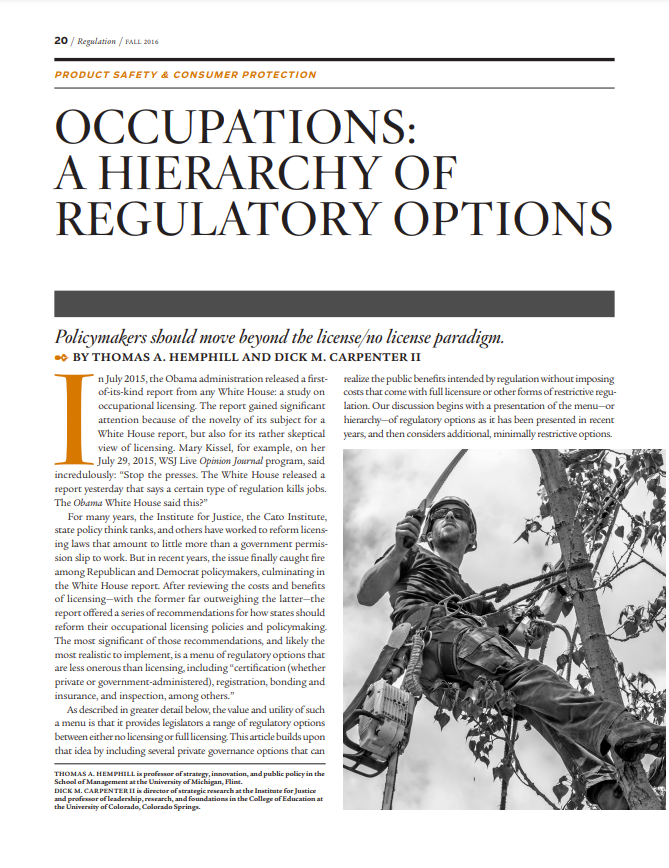
Economic Liberty | Occupational Licensing
Occupations: A Hierarchy of Regulatory Options
Momentum is growing in favor of reining in excessive occupational licensing. However, policymaking in this arena is too often plagued by assumptions that the only regulatory options are no licensing or full licensing. Such binary…
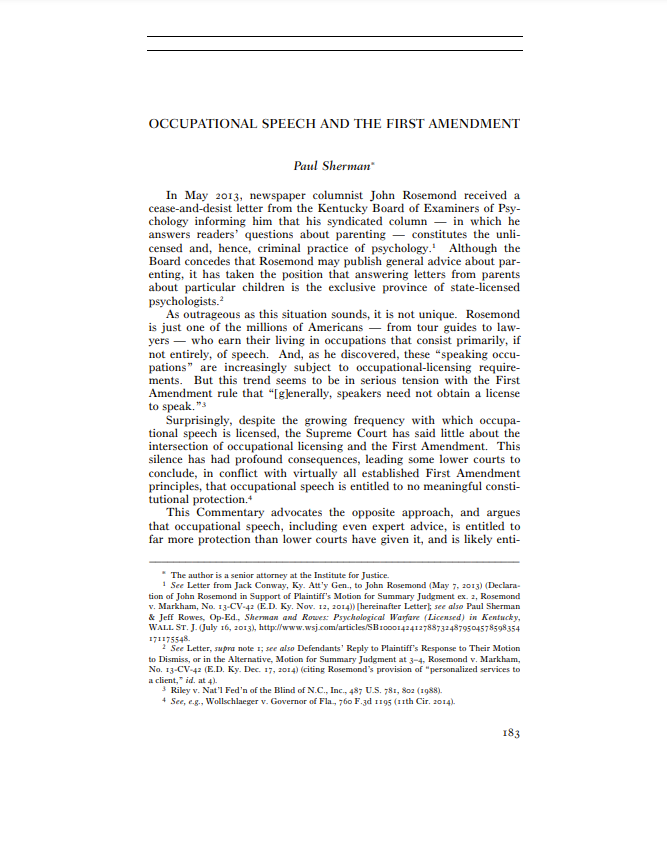
First Amendment | Occupational Speech | Tour Guides
Occupational Speech and the First Amendment
In May 2013, newspaper columnist John Rosemond received a cease-and-desist letter from the Kentucky Board of Examiners of Psychology informing him that his syndicated column — in which he answers readers’ questions about parenting —…
Regulating work
This study examines the scope and burden of occupational licensing laws in the United States for 102 low- and moderate-income occupations. Findings indicate that the licences studied require of aspiring workers, on average, $US209 in…
When legal is not ethical
Civil forfeiture laws in the United States facilitate, indeed encourage, unethical behavior on the part of law enforcement officials. Civil forfeiture is a mechanism by which law enforcement agencies can seize property merely with a…
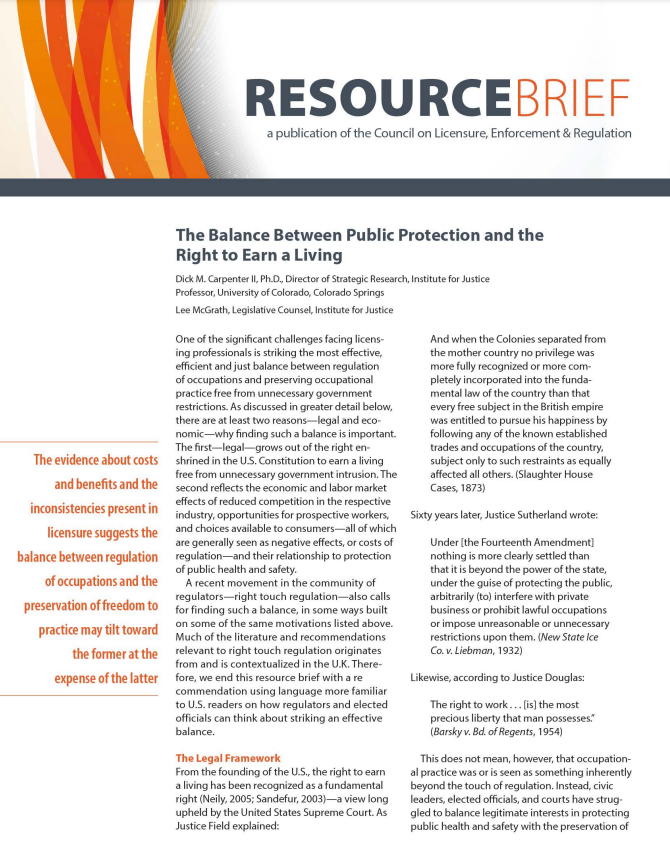
Economic Liberty
The Balance Between Public Protection and the Right to Earn a Living
One of the significant challenges facing licensing professionals is striking the most effective, efficient and just balance between regulation of occupations and preserving occupational practice free from unnecessary government restrictions. As discussed in greater detail…
Economic Liberty | Occupational Licensing
Testing the Utility of Licensing: Evidence from a Field Experiment on Occupational Regulation
This study examines hypothesized benefits associated with occupational licensing in one long-regulated industry in Louisiana—floristry—in order to determine to what extent licensing results in theorized benefits that might justify the costs associated with licensure systems.
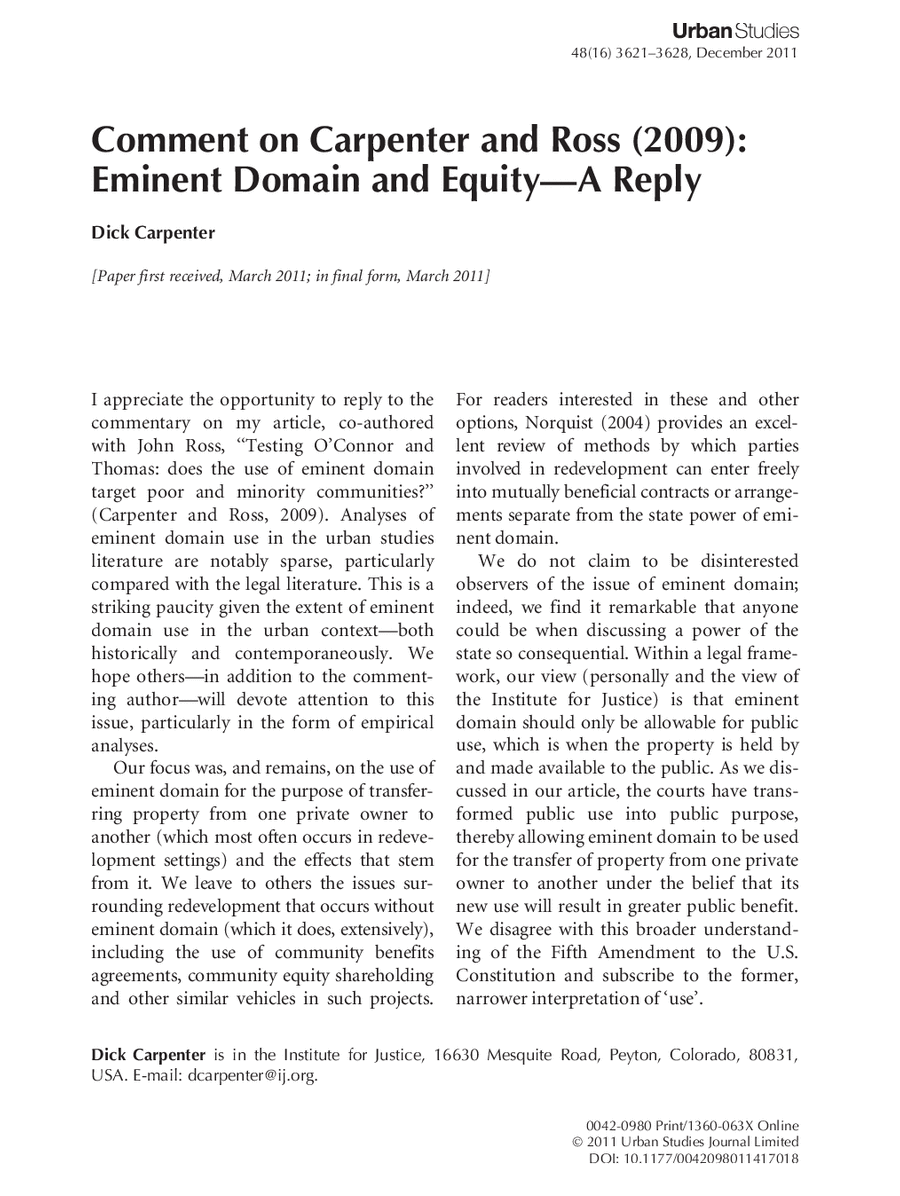
Eminent Domain | Private Property
Comment on Carpenter and Ross (2009): Eminent Domain and Equity—A Reply
In this report, Director of Strategic Research Dick Carpenter responds to commentary on his article about the effects of eminent domain on poor and minority communities. Suggested citation: Carpenter, D. M.
Economic Liberty | Occupational Licensing
Who’s Misleading Whom? Defining Titles in Occupations ‘On the Make’
Can occupational titles mislead the public? Should the use of titles be regulated to protect against such a possibility? Traditionally, occupational regulation is conceptualized as a restriction on the practice of an occupation through licensure,…
Economic Liberty
The Power of One Entrepreneur: A Case Study of the Effects of Entrepreneurship
This study examines the effects of entrepreneurship through qualitative case study methods. It examines the life and work of a single small-business entrepreneur in Tupelo, MS to discern how she affects her community both economically…
Eminent Domain | Private Property
Do restrictions on eminent domain harm economic development?
After the U.S. Supreme Court upheld in the Kelo decision the use of eminent domain for private-to-private transfer of property for economic development, public outrage was followed by attempts to restrict such use of eminent domain. Opponents…
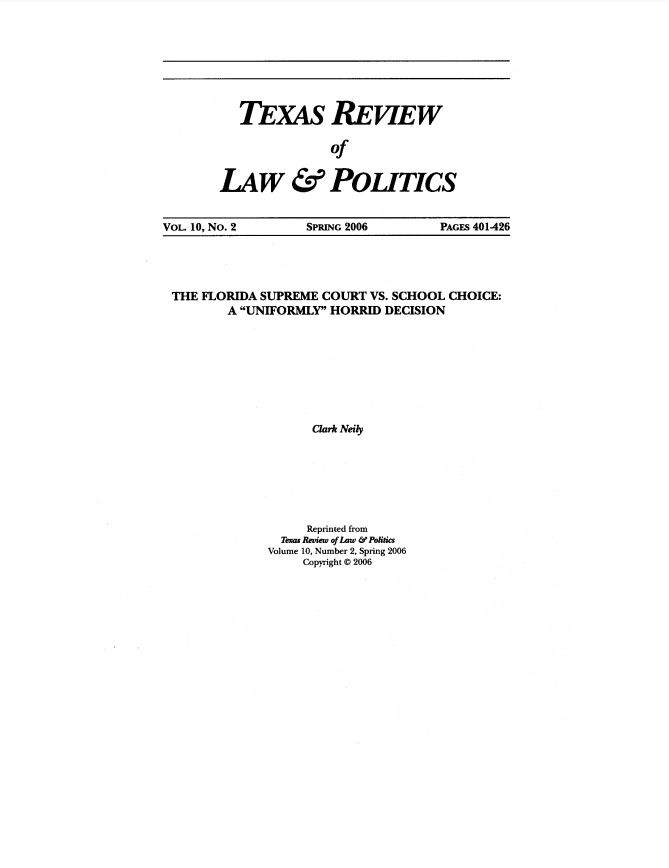
Educational Choice
The Florida Supreme Court vs. School Choice
School choice is the civil rights issue of the twenty-first century. In the Information Age, knowledge is not just power—it is destiny. As a result, no issue more fundamentally divides the “haves” and the “have-nots”…
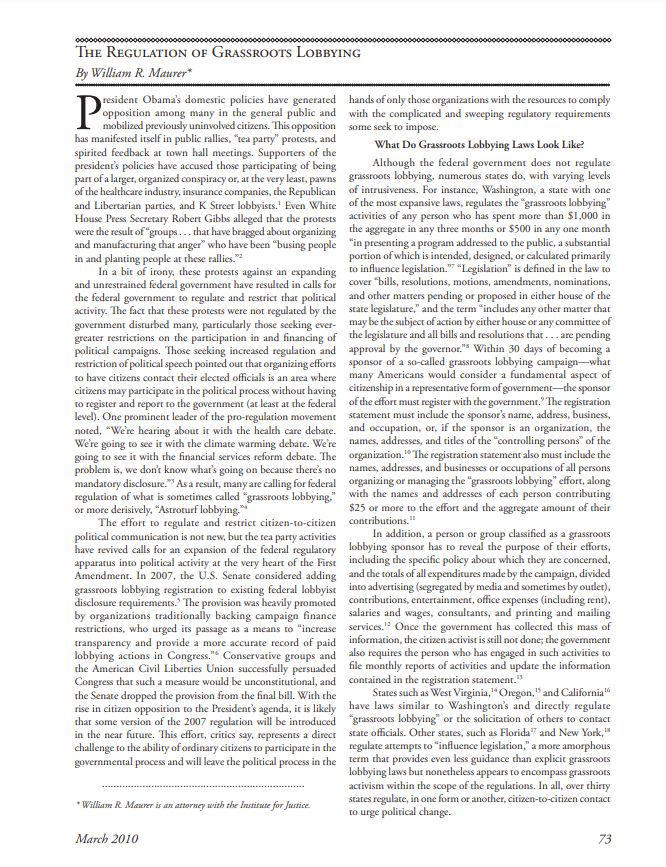
First Amendment
The Regulation of Grassroots Lobbying
President Obama’s domestic policies have generated opposition among many in the general public and mobilized previously uninvolved citizens. This opposition has manifested itself in public rallies, “tea party” protests, and spirited feedback at town hall…
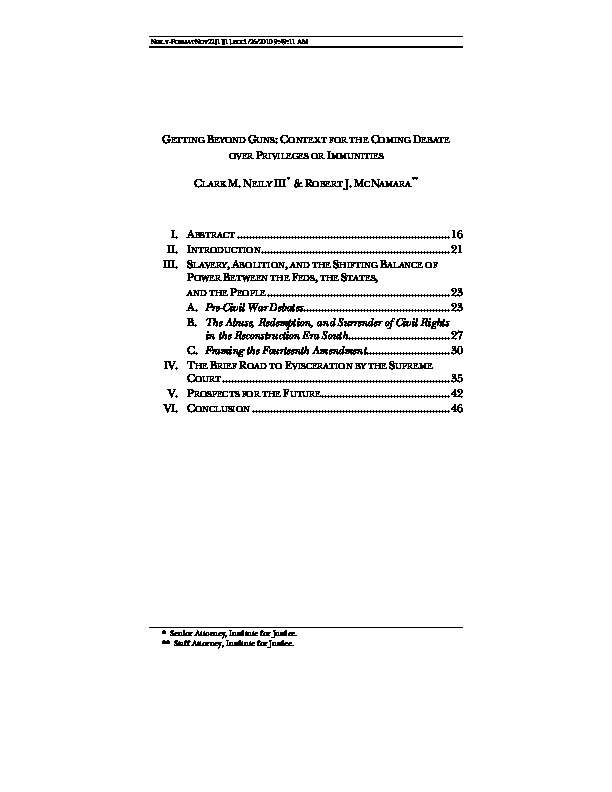
Other
Getting Beyond Guns
The Fourteenth Amendment represents a deliberate decision by the people of this nation to make the U.S. Constitution—not state constitutions and not state officials— the primary guardian of liberty in America. The purpose of the…
Other
The Right to Keep and Bear Arms in the States
District of Columbia v. Heller was an easy case to get right. First, there was the text of the Second Amendment, which plainly states that “the right of the people to keep and bear Arms,…
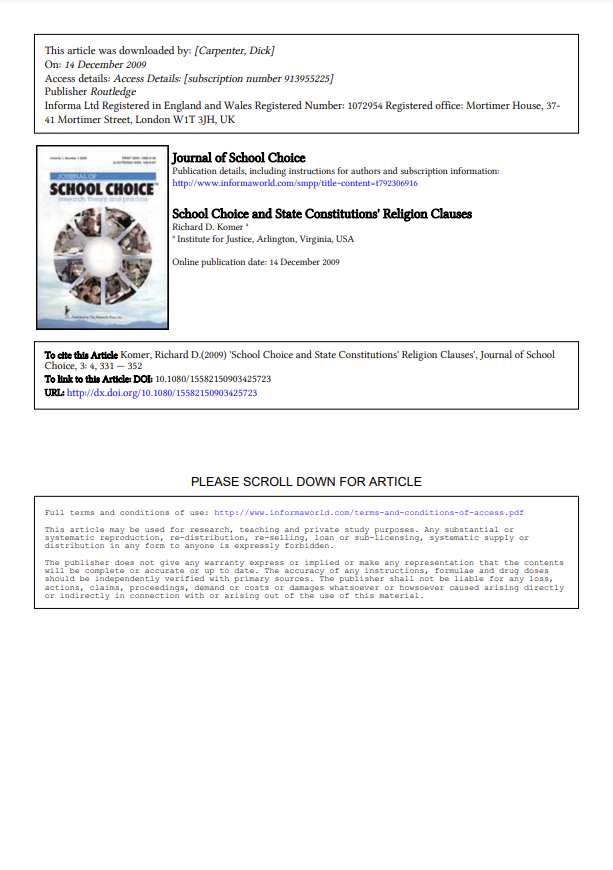
Educational Choice
School Choice and State Constitutions’ Religion Clauses
After the U.S. Supreme Court’s decision in Zelman v. SimmonsHarris, only state religion clauses represent a potential constitutional bar to the inclusion of religious options in properly designed school choice programs. The two most significant…
